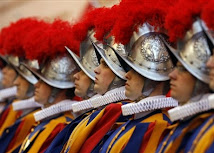This week my school is observing "World Language Week" so in my theology classes students are learning a handful of phrases in Latin and Greek, listening to prayers in Hebrew and Aramaic, some are learning the Pater Noster and Ave Maria, and well, some of them are reading this little essay of mine:
A few thoughts about language to begin:
First, language is largely symbolic in itself. That is to say that the words we use to communicate merely represent the thoughts, actions, emotions, or truths we are trying to convey. In this sense, God transcends language. We find evidence of this transcendence when Moses asks God his name, and he responds with the ineffable "Yahweh" or "I AM". As such, I do not think that God hears my prayers more clearly if they are in Latin, or if he does, it is not merely because they are in Latin, but because the use of a language that is not my vernacular has forced me to focus on the intention of my prayer and to be conscious in a way that I might not be if I were rattling off the same prayer in English.
I will also add that the Latin prayers that are the patrimony (heritage) of the Church are usually quote potent and poetic to the point of being sublime. Beauty, the Catechism tells us, is one of the transcendentals which means if we pursue it in its authentic forms it will lead us to God. The Latin prayers retain that beauty and potency in a way that most contemporary English translations do not. (Fr. John Zuhlsdorf, author of the blog, "What does the prayer really say?"calls these the "lame duck translations" for precisely this reason. A quick perusal of his blog will provide many examples.)
Jesus does, of course, tell us that when we pray we are not to "babble on like the pagans who think they will be heard because of their many words." However, an eloquent prayer, as I said, does not increase the likelihood of God hearing it, but rather it does lift the heart, mind, and soul of the pray-er to God. And too, there is the difference between a liturgical prayer which is formal, planned and extemporaneous prayer, which is "off the cuff." In addressing the latter Jesus is telling us not to be anxious about what we will say, for our Father already knows what we need. If communicating to God were the only purpose of prayer then all we would have to do is think. But prayer is entering into a conversation with God and a shift of language or tone can help us to develop a keener perception of the conversation.

Latin, which has enjoyed pride of place for centuries, is not the "original" language of the Church. Jesus and his contemporaries spoke Aramaic, Hebrew, and likely Greek. These are the languages in which the New Testament authors wrote, the languages in which the Apostles preached, and the languages in which the infant Church prayed. At the end of the apostolic era and beginning of the patristic the locus of the Church shifted westward and Greek began to wane, being replaced by Latin, the language used by all of the western Fathers.

The reign of Latin lasted for over a millennium and it was in Latin that the formative doctrines of the Church were first articulated and took shape. In this sense it is truly the Native language of the Church. Sacrosanctum Conclium, the Vatican II document on the liturgy, said that a "suitable place" could be allotted to the various vernacular languages of the world in the liturgy, but that Latin remained the official language of the Church and her worship, and that pastors should make every effort to ensure that the faithful were able to pray in Latin the parts of the mass that pertained to them. This seed from the tree of Vatican II has never really germinated, let alone come to fruition.
Finally, ours is truly a Catholic, a universal Church and that requires a universal language. The Latin language favors no living culture or ethnicity, and all people can feel equally welcome (or alienated) by it. (Preventing the latter is why pastors were to catechize their parishes in Latin.) When we pray in Latin we not only transcend the boundaries of culture or ethnicity, but the very boundaries of time, for we cry out to God in the same tongue as countless saints and holy ones of ages past.
There may come a time, and it may already be here, when English or Chinese is to the world what Latin was for over 1,000 years. Living languages are in flux, always changing. To try to translate liturgical texts into the vernacular always presents the challenge of capturing the essence of a word or phrase in an idiom that speaks to another time or culture. Using Latin, which is a static, unchanging language, creates a sort of standard or template by which one can objectively critique any future translations. It facilitates the continuity and unity that Christ so desperately wanted for His Church...and it just sounds Divine. Check out any of the videos below - each only about a minute long, and see if, at some level, you don't agree.
Ave Maria (Hail Mary) (Listed as "music to relax to"?)





No comments:
Post a Comment